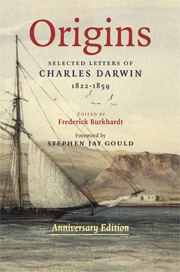 Questions, questions.
Questions, questions. Darwin was very inquisitive. He had to be. But this letter has a wonderful quality to it. He’s about to go collecting pigs’ jaws to count teeth. After all, that crafty Bechstein just can’t be trusted.
Do birds wash their feet? Send out the servants!
Plus, his buddies are mailing cat carcasses around. Wouldn’t quite fly with the postal service today!
All that aside, Darwin is working on plant vectors; seeing if owl pellets (remember the mouse skeletons?) contain seeds, and whether they get coughed up mid-flight.
The letter continues after the jump.
To: T. C. Eyton 31 August, 1856
Down Bromley Kent
Aug 31st
Dear Eyton
I thank you heartily for your note & for your promise of more information on Pigs, about which I am very curious.—By the way Bechstein asserts that the number of incisors varies greatly in domestic pigs: I am myself going to collect Pigs jaws (no other part) to see whether he is to be trusted. Have you ever noticed this? I shd like to confirm Bechstein on your authority.
I had no idea that your Stud Book was so well illustrated; I suppose you mean me to return the Plates, so I do. But I have been very glad to see them. Just after writing to you, I found what my memory told me of: viz an article by some apparently well informed person in Quarterly Review (1849 p. 392) who says there is a split of unknown origin in this breed,—one strain having white face tawny sides & upward directed horns; the other a speckled face, generally white line down back, shorter legs & more horizontal horns. In my Book on Variation which is progressing (but Heaven knows what it will turn out) I shd. like to give this case trifling as it is; for it is so rare to trace commencement of even a sub-breed of a sub-breed; & I shd. like to quote your remarks in your note, & will append Author of the “Stud Book on Herefordshire Cattle” Is this correct title? If you can give me any other information about these two families of Herefordshire I shd. be very grateful: I suppose you do not believe about short-legs; but just bear this point in mind.—
What a wonderful collection of Birds you have! I had not the least idea of your richness.
I remember well your case of the geese & shall have to quote it. What became of the grandchildren geese? did you continue to breed from them? I have lately been making enquiries in India, where there are flocks of the half-bred-geese habitually kept.—
One of the subjects which gives me most trouble for my work, is means of distribution in the case of species found on distant islands; I have lately been trying the powers of resistance of seeds to sea-water,—their powers of floating—the number of living seeds in earth & mud &c &c.— Would you render me a little assistance in this line? My walking days are over, never to return. I want to know whether on a wet muddy day, whether birds feet are dirty: I am going to send my servant out with some keeper & he shall wash all the partridges feet & save the dirty water!!
But I want especially to know whether herons or any waders (we have no ponds hereabouts) or water-birds when suddenly sprung have ever dirty feet or beaks? I found in 2 large table-spoon full of mud from a little pond from beneath the water 53 plants germinated.—
Do you know when owl or Hawk eats a little bird, how soon it throws up pellet? Can it throw up pellet whilst on wing? How I shd. like to get a collection of pellets & see whether they contained any seeds capable of germination. Could your gamekeepers find a roosting place, & collect a lot for me?—
Lastly (if you are not sick of my enquiries) have you ever examined the stomachs of dace & other white fish? Do they ever eat seeds; I know it is good to bait a place with grains. For like the house which Jack built, a heron might eat a fish with seed of water plant & then fly to another pond.
I have been trying for a year with no success to get some dace &c. Have you any & could you catch some in net. & order your kitchen maid to clean them, & you cd. send me the whole stomach & I would sow the contents on burnt earth with every proper precaution. If ever your goodnature shd. lead you to send me any such rubbish; it might be put in bladder or tin foil & sent by Post, & if you will not think me very impertinent I could repay you the shilling or two for postage; as the rubbish wd. thus come much quicker & cheaper to me.
Do you mean to collect cats’ skeletons: Sir C. Lyell has odd Persian & I have heard of another odd cat & I wd. request their carcases to be sent to you, if you cared about them. But I fancy cats are much mixed beings.—
Well I have put your words, that you like hearing from old naturalist friends, to a severe test. So forgive me & believe me, | Your’s most truly | Ch. Darwin
Latest Comments
Have your say!